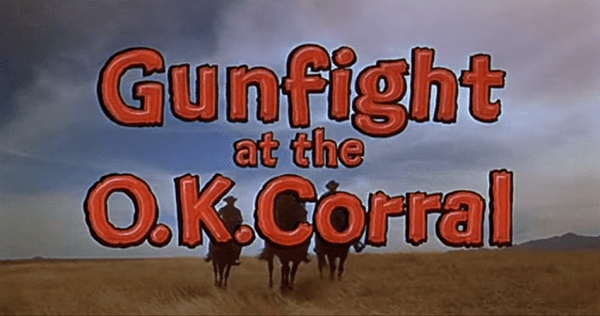Some historians will say that gun control and confiscation has never been popular, starting with the British attempt to disarm the colonial militia in Lexington and Concord to the present day, but the incident that may best illustrate the problem occurred 136 years ago today in an empty lot on Fremont Street in a dusty mining town called Tombstone.
In the short time frame of 30 seconds, American legends were born. The myth of the Wild West was forever etched into U.S. history. Wyatt Earp and Dr. John Henry “Doc” Holliday secured their prominence in American folklore, while Frank and Tom McLaury and Billy Clanton secured their positions in the Tombstone cemetery. Possibly the best portrayal of the gunfight’s duration was in “Wyatt Earp,” the 1994 film epic that somehow gets panned in comparison to 1993’s “Tombstone.” Violent confrontations unfold fast, and they are noisy.
There were long-simmering tensions between Wyatt and his brothers Morgan and Virgil and the Clanton-McLaury faction, which was part of a larger band of western outlaws that included John Ringo, William “Curly Bill” Brocius, and a whole crew of supporting characters that could have come from Central Casting for a western epic.
But in the end, it boiled down to an attempt by local law enforcement to disarm several men who were violating a city ordinance that might be described today as a “gun free zone.” In those days, people who had been arrested still were able to own and carry firearms, but in Tombstone, people just couldn’t carry them in town.
A few days ago in Kent, a suburban city south of Seattle, an undercover officer was in a shootout with a couple of suspects who allegedly had offered to sell a handgun stolen from a police officer’s home. No correlation? Quite the opposite; a law enforcement officer was attempting to arrest a pair of suspects over a gun law violation. The times may be different, but the basic issue is the same.
In the aftermath of the OK Corral gun battle, which didn’t really happen in the corral despite a string of classic and not-so-classic western films to the contrary, the outlaw faction demonstrated then, as they continue to this day, that gun laws don’t prevent bad people from doing bad things or keep guns out of their hands. Virgil Earp was later permanently disabled in a violent attack and Morgan Earp was fatally shot.
The outlaw faction didn’t fare much better. Several of their faction, including Ringo and Brocius, met violent ends.
If Tombstone illustrated anything it would be that gun control laws, no matter how well-intentioned, do not prevent killing, shooting or other misbehavior with firearms by the wrong people.
This lesson seems to be lost on those who advocate for gun control today. Honest people will obey the law (while fighting it in court or on a ballot or in the legislature). Bad guys simply don’t bother with the formalities.
But it makes for good cinema. Just ask Kurt Russell, Kevin Costner, Burt Lancaster, Kirk Douglas, Val Kilmer and Dennis Quaid.
